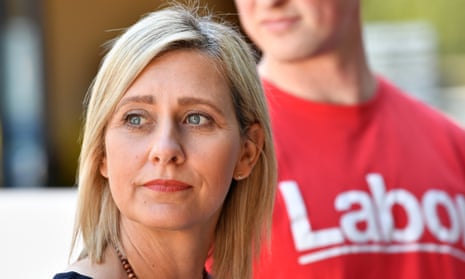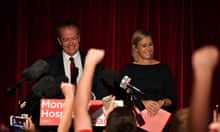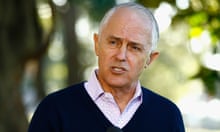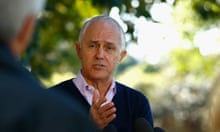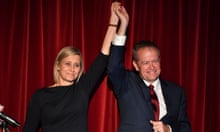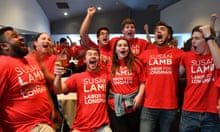It’s been a strange few months in Australian politics, a long period of hyper-alert suspended animation waiting for super Saturday.
Out on the ground in the seats where the byelection contests have been fought, campaigners are reporting mass fatigue. Voters – assailed by polling companies and politicians and teams of door-knockers and fly-in-fly-out journalists vox-popping in their shopping centres and pubs for weeks – just want the whole circus to end.
Saturday night is important. Voters in Longman and Braddon will determine what happens in Australian politics over the next six months, and going into polling day both feel too close for strategists to call. Seat polls are notoriously unreliable, and neither party has invested massive resources in research.
A strong result for the Coalition on Saturday night increases the chances of an early federal election, despite the fact Malcolm Turnbull really doesn’t want one. The prime minister wants an election next year.
A strong result for the Coalition also increases the chances of instability on the Labor side of politics – something we’ve not seen much of during this period in opposition.
If Labor holds both seats comfortably, the field evidence will suggest the opposition remains on track to take government at the next federal election, lessening the immediate pressure on its leader, Bill Shorten. If the results are tight, or the seats are lost – the dynamics of marginal seats and the complications associated with the age of political disruption notwithstanding – that’s something else.
After the results come in, both the major parties – if they’ve got any brains and any desire to be truthful with themselves – will ask the obvious questions: are we on track to win the election contest that matters and, if we aren’t, how big is the gap between where we should be, and where we are, and what is the best means of closing it?
To set ourselves up for that inevitable post super Saturday reckoning, let’s recap the story of the first half of 2018.
The Coalition throughout this year has made a conscious effort to decouple its core operation from sensation to try and reset its political fortunes. If we plot a path through the year, Turnbull jettisoned Barnaby Joyce and his exploding private life, the government crafted an economic message for a pre-election budget, and is now attempting to land an energy policy.
Let’s call this strategy putting one foot in front of the other. The yield from that, according to the trend in all major opinion polls, is the political contest has tightened over the past six months, and Turnbull’s approval ratings have improved.
Given Peter Dutton looms a little too oversized for comfort – lurking like a standing invitation – and Tony Abbott continues to thrash about like an overstimulated toddler, things could be better. But if you ask the government, the message you’d get is things have absolutely been worse.
On the Labor side, things have been less steady as she goes. While the opposition ploughs on as a political fighting force with formidable discipline and focus, and remains ahead in the polls, there have been a number of important challenges playing out behind the scenes.
In no particular order, Shorten has had to navigate a nasty factional war he helped foment in Victoria, where he’s had to straddle the demands of old friends with long memories and new ones with sharp elbows.
The battle between Wayne Swan and Mark Butler for the ALP presidency – normally a complete non-event – was a fascinating internal proxy war on two fronts.
As a straight power play, it was a slugfest between the Albanese forces and the Shorten forces, tribes that never got around to folding their tents after the resolution of the leadership ballot in 2013. As a policy discussion, it was a conversation about whether Labor’s offering in 2018 should be heavier on labourism or progressivism, which is really a polite public conversation about whether the core strategy is right.
In private, there is also anxiety about the influence of union leaders Shorten relies on as the bedrock of his institutional power. The party needs the relationship with unions to help define its enduring values. It also needs the campaign force of the union movement to win elections, the army of foot soldiers helping Labor outgun the Coalition on the ground. But there is concern about capture, and the tail wagging the dog.
Anthony Albanese over the past month has signalled to colleagues, and to the world at large, if the result on Saturday night is bad he’s ready and available to be drafted.
As of now, it’s the rule of thirds. Some colleagues are furious with the Albo fan dance. Others are quietly lining up in the event it’s battle stations. Others are on the fence, wondering if a different leader is the answer to the problem, and even if it is, if the transaction costs ultimately outweigh the benefits. Anyone who has lived through the past decade in Australian politics, who hasn’t yet taken leave of their senses, will ask themselves the transaction costs question.
So we are at a sliding doors moment. If Labor lands safely, that’s one thing. One reality asserts itself. But if Saturday night is bad for Labor, you can guarantee the organising questions I’ve already posed will be asked: are we in a winning position, and if we aren’t, what do we need to do about it?
These questions have more urgency and potency when you consider the psychology of the people asking them.
Labor as a collective thinks it should win the next federal election. It thinks it has a stronger ministerial team than the government, sharper political instincts, better discipline, and has a sharper ground game.
The opposition has been ahead in the polls since it almost won the last federal election. If Labor feels a legitimate chance slipping, if opposition starts to feel like a long-term proposition rather than a transitory state, the collective anxiety level increases.
And so does the appetite for risk.
